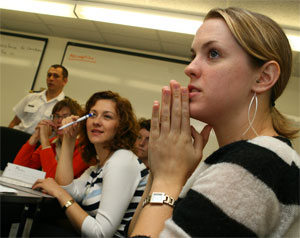 |
| IN THE HOT SEAT: Kristen Curren, a Master's student in political science, plays the role of the Department of Foreign Affairs' director general for consular affairs. (Nick Pearce photo) |
Deep in the halls of power they gather. Their problem: Canadian tourists are stranded on a small Caribbean island that’s been blasted with a major hurricane. Their task: recommend a course of action to the Canadian government.
Almost immediately, civilian and military members of the Interdepartmental Working Group realize they don’t have nearly enough intelligence on the ground. They’re facing an information gap that’s quickly filled with questions. “Why weren’t we there sooner?” “We need a plan!” “What is the government direction on this?” “What do we do now?”
Eventually, cooler heads prevail and the group starts brainstorming solutions, filling the room’s white boards with lists and charts. Forty minutes later, they finally seem to be getting somewhere.
But their confidence is premature and shattered when an intelligence officer calls an emergency briefing in the next room. Jaws drop as the details spill out: all hell has broken loose on the island of St. Gertrude.
Political actors
You may be wondering why you’ve never heard of this crisis, let alone a Caribbean island named St. Gertrude. In fact, neither exist: the scenario has been created by retired military officer Bob Edwards as part of a simulation designed to teach students about how the Canadian government responds to an international crisis.
“They get to participate in a realistic crisis which replicates what takes place in the real world,” says Mr. Edwards, a 35-year veteran of Canada’s armed forces who now volunteers as a Research Fellow with Dalhousie’s Centre for Foreign Policy Studies (CFPS). “We get them to play the roles of real government officials and develop options, a recommended course of action and media points.”
Mr. Edwards has been running this simulation at Dalhousie for the past five years, based on a core scenario developed in 2000 by the CFPS’ David Griffiths. Late last month, 28 students from various degree programs, along with 12 military officers, took part in the exercise at CFB Halifax. It was conducted in a facility designed specifically for strategy simulations. The location enhanced the authenticity of the exercise, which Mr. Edwards says is almost identical to how a real government meeting dealing with an international crisis would be run.
Rob LaForte, a second-year political science student who took part, said he signed up to get a different perspective on his studies. “It’s a really good learning opportunity,” he said. “It’s a new experience that’s separate from class; it’s more of a direct application.”
Jennifer Chisholm, a second-year poli-sci student who also majors in international development studies, agreed. “I have a strong interest in foreign relations, and this gives real insight into how things work in a crisis.”
New perspectives
For many participating students, it was their first experience working with military personnel. While the civilian roles – positions in Foreign Affairs and International Trade Canada, the Privy Council, Public Safety Canada and the Canadian International Development Agency – were played by Dal students, Canadian Forces officers played the military leadership roles. Coming into the exercise with different perspectives and their own sets of intelligence files, the two groups collaborated to achieve solutions.
As the day unfolded, more information came in from “the field,” allowing the groups to work towards final recommendations. The clock was ticking – participants regularly received fictional media updates and urgent messages reminding them time was of the essence. To help them stay focused, each team was paired with an experienced foreign affairs/military mentor. When they reached their 2 p.m. deadline, teams presented recommendations to the other groups and answered questions on their course of action.
Reflecting on the day’s events, Mr. Edwards said he was impressed by the students’ capacity of the students to grapple with the big questions of Canadian foreign policy.
“The simulation gives them an appreciation for the dilemmas that Canada faces in crisis situations,” he said. “Hopefully this will lead them to think critically about our foreign policy capabilities and our role in the world.”
